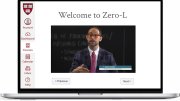Amid wide concern driven by the COVID-19 pandemic (Is it safe to attend?) and recession (Can I afford it?), with many colleges and universities expecting enrollment to plummet this fall, Harvard Law School (HLS) has decided to offer Zero-L—its online, pre-matriculation orientation to legal education—free to law schools nationwide, beginning July 1. This “on-ramp” to the unique features of legal reasoning, writing, and pedagogy (reported in detail here) was designed to introduce students from diverse backgrounds, with increasingly diverse academic preparation, to their first-year experience, so they can embark on their professional education more confidently and proficiently. By making the online experience available to all schools for free (HLS originally intended to offer it on a fee basis), the school is supporting legal education generally, at a time when:
- many formerly in-residence orientation sessions will be curtailed or moved online this summer;
- prospective students, especially those with financial constraints, may be questioning their ability to proceed; and
- peer institutions’ budgets are under strain.
In a statement announcing the decision, HLS dean John F. Manning—a first-generation college and law-school student, who discusses his challenging transitions in personal terms in Zero-L—said, “When I arrived at HLS as a first-year student, I felt very much out of my depth in those crucial first weeks.” He continued:
I didn’t know the differences between state and federal courts, what the common law was, or even what a “litigator” does for a living. Like a lot of other new law students, I felt that everyone around me “got it,” and I just didn’t. We launched Zero-L to give incoming students from day one a common baseline of knowledge about the American legal system and about the vocabulary of law and to give them the confidence that they can succeed.
Zero-L, which typically involves 12 to 14 hours of interactive, online learning, was developed in 2018 in cooperation with the vice provost for advances in learning (VPAL; see “Rebooting Online Education” in the May-June Harvard Magazine), and deployed that summer. Last year, it was also used by four partner law schools—Boston College, Northeastern University, Seton Hall University and the University of Baltimore—all of which intend to participate again this year.
“This has been an incredibly challenging period for so many,” said Manning in the announcement. “If Zero-L can help ease the transition and strengthen student success at other law schools at is has done at HLS, then we want to offer that support to all law schools by waiving the fee and making the course available for free this year.”
VPAL will also adapt the sections of Zero-L focusing on civics and American governance for free access by any prospective learners on the HarvardX platform. (Read a perspective on civics education here.)
“I know first-hand the devastation this pandemic is causing to our social structure,” said Zero-L faculty director, Attwood and Williams professor of law I. Glenn Cohen, who specializes in health law and bioethics. “I know how many students are finding their time in college disrupted, and their plans to really ‘hunker down’ and get ready for law school disrupted by a sick family member or the need to help support their families.” In light of those constraints, and the limitations on regular orientations this summer, he continued, “[K]nowing we had an excellent course with a demonstrated ability to help students start law school, making it freely available this year seemed like a small thing HLS could do for law students and law schools across the country to try to make the fall 2020 just a little bit easier.”
It will be interesting to see whether the HLS experiment encourages other Harvard schools to extend similar assets—to lend a helping hand elsewhere in higher education—in the fraught months ahead.
HLS’s new online course site provides an overview of Zero-L here. The school’s news announcement has embedded video elements from Zero-L.









